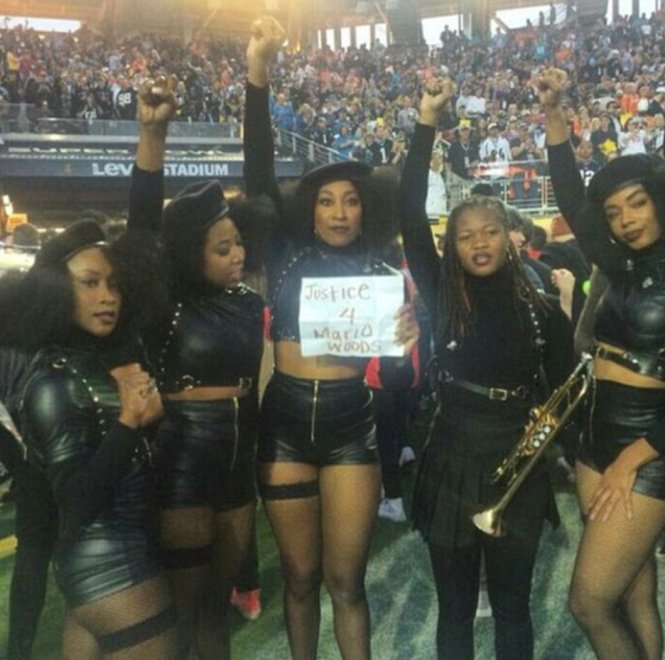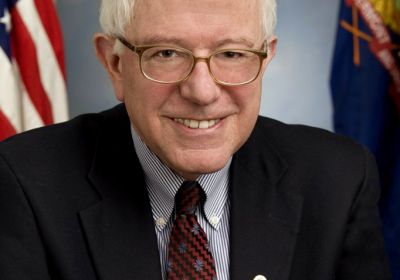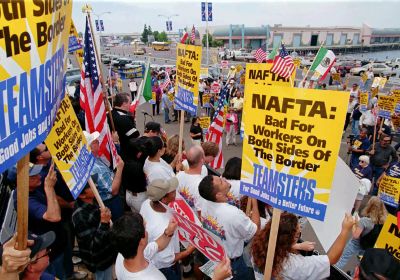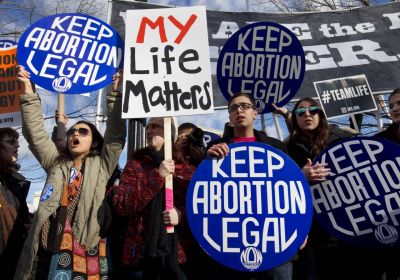 Beyoncé's backing dancers display a "Justice for Mario Woods" sign.
In the San Francisco Bay Area in California, where tent cities are slowly re-forming under bridges after being swept away in a “cleansing” of the homeless ahead of the February 7 NFL Super Bowl, there is still a palpable buzz about Beyoncé's performance in the Super Bowl half-time show (sorry, Coldplay).
In fact, it is a topic with far more currency than the actual dud of a game — and for good reason.
Beyoncé's backing dancers display a "Justice for Mario Woods" sign.
In the San Francisco Bay Area in California, where tent cities are slowly re-forming under bridges after being swept away in a “cleansing” of the homeless ahead of the February 7 NFL Super Bowl, there is still a palpable buzz about Beyoncé's performance in the Super Bowl half-time show (sorry, Coldplay).
In fact, it is a topic with far more currency than the actual dud of a game — and for good reason.
-
 Beyoncé's backing dancers display a "Justice for Mario Woods" sign.
In the San Francisco Bay Area in California, where tent cities are slowly re-forming under bridges after being swept away in a “cleansing” of the homeless ahead of the February 7 NFL Super Bowl, there is still a palpable buzz about Beyoncé's performance in the Super Bowl half-time show (sorry, Coldplay).
In fact, it is a topic with far more currency than the actual dud of a game — and for good reason.
Beyoncé's backing dancers display a "Justice for Mario Woods" sign.
In the San Francisco Bay Area in California, where tent cities are slowly re-forming under bridges after being swept away in a “cleansing” of the homeless ahead of the February 7 NFL Super Bowl, there is still a palpable buzz about Beyoncé's performance in the Super Bowl half-time show (sorry, Coldplay).
In fact, it is a topic with far more currency than the actual dud of a game — and for good reason.
-
 Support for self-described socialist Bernie Sanders is based on his policies, such as supporting union campaigns for a $15 minimum wage.
It can be difficult to understand what capitalist elections say about the relation of class forces. This is especially true for the United States where there are no mass workers parties of any type. The two pro-capitalist parties, the Democrats and the Republicans, dominate.
Support for self-described socialist Bernie Sanders is based on his policies, such as supporting union campaigns for a $15 minimum wage.
It can be difficult to understand what capitalist elections say about the relation of class forces. This is especially true for the United States where there are no mass workers parties of any type. The two pro-capitalist parties, the Democrats and the Republicans, dominate.
-
 Armed thugs, some with signs supporting Republican presidential candidate, Ted Cruz, intimidate worshipers at a mosque in Irving, Texas. November 21.
In her 2007 book The Shock Doctrine, Canadian author Naomi Klein discusses how capitalist governments and corporations exploit disasters to further their interests against the rest of us.
Armed thugs, some with signs supporting Republican presidential candidate, Ted Cruz, intimidate worshipers at a mosque in Irving, Texas. November 21.
In her 2007 book The Shock Doctrine, Canadian author Naomi Klein discusses how capitalist governments and corporations exploit disasters to further their interests against the rest of us.
-
 California has what is called a Mediterranean climate, which means it has two seasons, wet and dry one. The wet one usually starts in November and lasts through the winter and early spring and is characterised by rain, and snow in the northern part of the Sierra Nevada Mountains. In the dry season, from mid-spring through October, there is little or no rain.
California has what is called a Mediterranean climate, which means it has two seasons, wet and dry one. The wet one usually starts in November and lasts through the winter and early spring and is characterised by rain, and snow in the northern part of the Sierra Nevada Mountains. In the dry season, from mid-spring through October, there is little or no rain. -
 Film director Quentin Tarantino at #BlackLivesMatter protest in New York City on October 24.
Ever since the Black Lives Matter (BLM) movement emerged on the streets to protest repeated police killings of African Americans, there has been a backlash, spearheaded by the police mutual benefit societies mislabelled labour unions.
Film director Quentin Tarantino at #BlackLivesMatter protest in New York City on October 24.
Ever since the Black Lives Matter (BLM) movement emerged on the streets to protest repeated police killings of African Americans, there has been a backlash, spearheaded by the police mutual benefit societies mislabelled labour unions.
-
 Reversing earlier promises to end US military involvement in Afghanistan, President Barack Obama has announced that US troops will remain indefinitely. He said they will not be ground combat forces, but trainers and advisers to the forces of the US-imposed warlord-dominated regime. US air strikes in support of the regime, by both piloted aircraft and drones, will continue. One such strike was the deliberate bombing of the Doctors Without Borders (MSF) hospital in Kunduz.
Reversing earlier promises to end US military involvement in Afghanistan, President Barack Obama has announced that US troops will remain indefinitely. He said they will not be ground combat forces, but trainers and advisers to the forces of the US-imposed warlord-dominated regime. US air strikes in support of the regime, by both piloted aircraft and drones, will continue. One such strike was the deliberate bombing of the Doctors Without Borders (MSF) hospital in Kunduz. -
 The spreading scandal of Volkswagen's falsifying of emission tests to evade regulations has begun to expose the cozy connections between the German government and the company. A recent article in the New York Times said: “There exists a revolving-door climate in which leaders glide between tops posts in government and auto firms.” But a recent settlement between the US government and General Motors reveals similar corruption.
The spreading scandal of Volkswagen's falsifying of emission tests to evade regulations has begun to expose the cozy connections between the German government and the company. A recent article in the New York Times said: “There exists a revolving-door climate in which leaders glide between tops posts in government and auto firms.” But a recent settlement between the US government and General Motors reveals similar corruption. -
Photo: Jewish Voice for Peace Albuquerque Chapter. For most of its existence since 1948, Israel has had the support of most Jews in the US. There have always, however, been some dissident voices, especially among Jewish members of socialist and communist groups.
-
 #BlackLivesMatter activists Marissa Johnson and Mara Willaford stormed the stage as Sanders began speaking and demanded an opportunity to address racial injustice. Seattle, August 8.
There is a lull in the large mass mobilisations associated with the Black Lives Matter movement, but the campaign targetting racism and police brutality remains central to politics in the US.
#BlackLivesMatter activists Marissa Johnson and Mara Willaford stormed the stage as Sanders began speaking and demanded an opportunity to address racial injustice. Seattle, August 8.
There is a lull in the large mass mobilisations associated with the Black Lives Matter movement, but the campaign targetting racism and police brutality remains central to politics in the US.
-
 Vermont Senator Bernie Sanders’ campaign to become the Democratic Party’s presidential candidate for next year's race has broken into the mainstream. Pitching left, Sanders consistently draws far larger crowds to hear him speak than any other aspirant in either the Democratic or Republican parties. Polls show his support is climbing, and in one state, New Hampshire, he has moved ahead of the Democratic front-runner, Hillary Clinton. He may win some states in the Democratic primaries.
Vermont Senator Bernie Sanders’ campaign to become the Democratic Party’s presidential candidate for next year's race has broken into the mainstream. Pitching left, Sanders consistently draws far larger crowds to hear him speak than any other aspirant in either the Democratic or Republican parties. Polls show his support is climbing, and in one state, New Hampshire, he has moved ahead of the Democratic front-runner, Hillary Clinton. He may win some states in the Democratic primaries. -

The Trans-Pacific Partnership (TPP) being negotiated between the US and 11 other Pacific Rim nations — including Australia — is a treaty covering regulations and investments.
-
 Since the 1973 United States Roe vs Wade Supreme Court decision in legalising most abortions, there has been a steady erosion of women’s abortion rights in the US - with the complicity of both major capitalist parties. A new wave of restrictions spearheaded by Republicans has developed in the past three years, gaining more traction in the past year.
Since the 1973 United States Roe vs Wade Supreme Court decision in legalising most abortions, there has been a steady erosion of women’s abortion rights in the US - with the complicity of both major capitalist parties. A new wave of restrictions spearheaded by Republicans has developed in the past three years, gaining more traction in the past year.